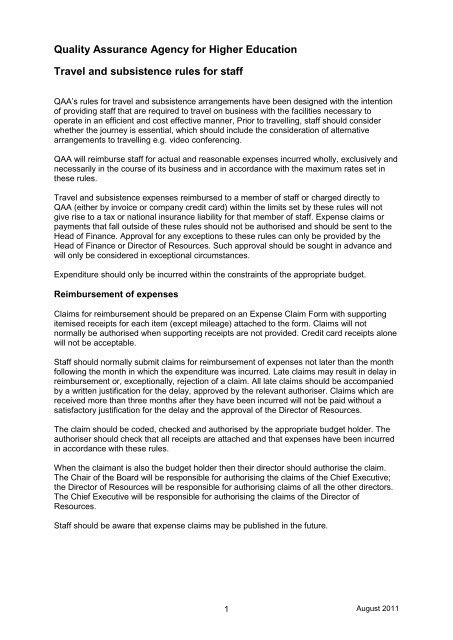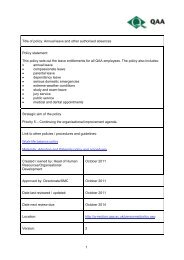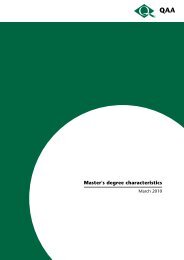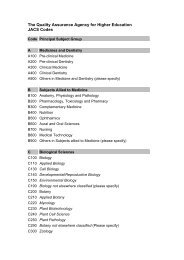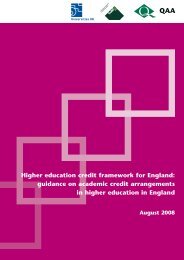Travel and subsistence rules - staff - The Quality Assurance Agency ...
Travel and subsistence rules - staff - The Quality Assurance Agency ...
Travel and subsistence rules - staff - The Quality Assurance Agency ...
You also want an ePaper? Increase the reach of your titles
YUMPU automatically turns print PDFs into web optimized ePapers that Google loves.
<strong>Quality</strong> <strong>Assurance</strong> <strong>Agency</strong> for Higher Education<strong>Travel</strong> <strong>and</strong> <strong>subsistence</strong> <strong>rules</strong> for <strong>staff</strong>QAA‟s <strong>rules</strong> for travel <strong>and</strong> <strong>subsistence</strong> arrangements have been designed with the intentionof providing <strong>staff</strong> that are required to travel on business with the facilities necessary tooperate in an efficient <strong>and</strong> cost effective manner, Prior to travelling, <strong>staff</strong> should considerwhether the journey is essential, which should include the consideration of alternativearrangements to travelling e.g. video conferencing.QAA will reimburse <strong>staff</strong> for actual <strong>and</strong> reasonable expenses incurred wholly, exclusively <strong>and</strong>necessarily in the course of its business <strong>and</strong> in accordance with the maximum rates set inthese <strong>rules</strong>.<strong>Travel</strong> <strong>and</strong> <strong>subsistence</strong> expenses reimbursed to a member of <strong>staff</strong> or charged directly toQAA (either by invoice or company credit card) within the limits set by these <strong>rules</strong> will notgive rise to a tax or national insurance liability for that member of <strong>staff</strong>. Expense claims orpayments that fall outside of these <strong>rules</strong> should not be authorised <strong>and</strong> should be sent to theHead of Finance. Approval for any exceptions to these <strong>rules</strong> can only be provided by theHead of Finance or Director of Resources. Such approval should be sought in advance <strong>and</strong>will only be considered in exceptional circumstances.Expenditure should only be incurred within the constraints of the appropriate budget.Reimbursement of expensesClaims for reimbursement should be prepared on an Expense Claim Form with supportingitemised receipts for each item (except mileage) attached to the form. Claims will notnormally be authorised when supporting receipts are not provided. Credit card receipts alonewill not be acceptable.Staff should normally submit claims for reimbursement of expenses not later than the monthfollowing the month in which the expenditure was incurred. Late claims may result in delay inreimbursement or, exceptionally, rejection of a claim. All late claims should be accompaniedby a written justification for the delay, approved by the relevant authoriser. Claims which arereceived more than three months after they have been incurred will not be paid without asatisfactory justification for the delay <strong>and</strong> the approval of the Director of Resources.<strong>The</strong> claim should be coded, checked <strong>and</strong> authorised by the appropriate budget holder. <strong>The</strong>authoriser should check that all receipts are attached <strong>and</strong> that expenses have been incurredin accordance with these <strong>rules</strong>.When the claimant is also the budget holder then their director should authorise the claim.<strong>The</strong> Chair of the Board will be responsible for authorising the claims of the Chief Executive;the Director of Resources will be responsible for authorising claims of all the other directors.<strong>The</strong> Chief Executive will be responsible for authorising the claims of the Director ofResources.Staff should be aware that expense claims may be published in the future.1August 2011
3 TaxisTaxis may be used where there is no other public transport available or when they aremore cost effective than other forms of transport. <strong>The</strong>y may also be used for shortjourneys with heavy luggage. Justification for the use of taxis should clearly begiven on the expenses claim form.Claims for taxi fares, including gratuities, which should not exceed 10 per cent of thefare, should be supported by receipts. All taxi drivers will produce a receipt ifrequested. Claims will not be re-imbursed if the relevant receipts are not attached.Taxis to <strong>and</strong>/or from UK airports must be approved in advance by the Head of Financeor Director of Resources.4 Private carsStaff are encouraged to use public transport whenever possible for business journeys.If no public transport is available, a hire car may be requested (see 6 below).If <strong>staff</strong> choose to use their own car for a business journey they must confirm to QAAthat they have appropriate insurance cover <strong>and</strong> a valid driving licence. In claimingbusiness mileage on an expense claim form the <strong>staff</strong> member is confirming that he/shehas such cover <strong>and</strong> will maintain such cover for any future business journeys.<strong>The</strong> mileage rate is set by QAA to cover the additional costs incurred by the car userincluding the cost of obtaining appropriate insurance cover.<strong>The</strong> mileage rate is set out in the table below:Business miles claimed in the tax yearUp to 10,000Over 10,000Mileage Rate45p per mile25p per mileBusiness miles can be claimed for journeys to a place where QAA business is beingconducted (the business meeting). Normal mileage to/from the place of work should bededucted where <strong>staff</strong> usually drive. <strong>The</strong> following table identifies business miles:Start Route End Claimable milesHome * Normal place of work (office) Home * None – this is the „normal commute‟Home * Business meeting Home * Whole journey less „normal commute‟ milesHome * Business meeting (within 10miles of normal place ofwork)Home * None – this journey is substantially the sameas the „normal commute‟Home * Business meeting Office Whole journey less „normal commute‟ milesHome * Business meeting(within 10 miles of normalplace of work)Office<strong>The</strong> lower of;Whole journey less „normal commute‟ milesorBusiness meeting to office milesOffice Business meeting Home * Whole journey less „normal commute‟ milesOfficeBusiness meeting(within 10 miles of normalplace of work)Home *Office Business meeting Office Whole journey<strong>The</strong> lower of:Whole journey less „normal commute‟ milesorOffice to business meeting miles3August 2011
Start Route End Claimable milesBusinessmeetingn/aBusinessmeetingHome * Normal place of work BusinessmeetingBusinessmeetingWhole journeyPlace of work to business meeting (providedthere is a substantive reason for calling atplace of work)Normal place of work Home * Business meeting to place of work(providedthere is a substantive reason for calling atplace of work)*Home is your normal weekday address – reimbursement of travel to/from analternative address would be restricted to the cost of travelling to/from your normalweekday address if this would be lower.Your normal place of work or office will be QAA‟s office per your employment contract.Note that if the journey is from home to a business meeting within a 10 mile radius ofthe normal place of work (or vice versa) then it is not classed as a business journey asHMRC deem this to be substantially the same as the “normal commute” <strong>and</strong> QAA isunable to reimburse the cost of such journeys.A hire car should be used where it is more cost effective to QAA than paying businessmileage. (see 6 below)If a member of <strong>staff</strong> chooses to use their own car when public transport or a hire carwould be more cost effective to QAA then any claim for business mileage will berestricted accordingly, unless prior approval obtained from Head of Finance of theDirector of Resources.Costs of parking charges will be reimbursed. Any fines or penalties incurred formotoring or parking offences will not be reimbursed under any circumstances <strong>and</strong> arethe responsibility of the member of <strong>staff</strong>.As an alternative to private car, <strong>staff</strong> may claim the following rates if they use motorcycles or pedal cycles for business journeys.Mode of transportMotor CyclePedal CycleMileage Rate24p per mile20p per mile5 Passenger RateIn addition to the mileage rate identified in section 4, <strong>staff</strong> who use their private vehicle<strong>and</strong> carry passengers who would otherwise be paid from QAA will be able to claim apassenger supplement at a rate of £0.05 per mile per passenger up to threepassengers.6 Hire carsHire cars will only be allowed with prior approval of the Head of Finance or Director ofResources <strong>and</strong> will not normally be allowed unless they are more cost effective thanalternative methods of transport. It will not be cost effective to hire a car for severaldays <strong>and</strong> only make use of it to travel to/from a destination on the first/last day.4August 2011
Example: 2-day business journey covering (a) 200 miles (b) 400 miles£ £Daily hire rate say £25 x 2 days 50-00 50-00Accident Damage Waiver 6-00 6-00Delivery <strong>and</strong> Collection (if applicable) 10-00 10-00Out of hours charge (if applicable)VAT @ 17.5 per cent on the above 9-98 9-98Cost of hiring a car 66-98 66-98Cost of refuelling (estimate @ 10p/mile) 20-00 40-00Total cost of hire car 95-98 115-98Cost to QAA of paying business mileage 80-00 160-00Cost to QAA of public transport 75-00 140-00Using this example a hire car should be used for the 2 day, 400 mile businessjourneyPrior to hiring a car, a member of <strong>staff</strong> should provide office services with a copy oftheir driving licence (paper part for holders of the photo licence). Office services areresponsible for checking the driving licence on behalf of the car hire companies usedby QAA. You should notify office services immediately of any changes to your licence(e.g. points, disqualification etc) as this may affect whether QAA can hire a car for you.Office services may check driving licences at any time during the year.A hire car should not normally be used by a member of <strong>staff</strong> to travel from their hometo their place of work or vice versa. If such a journey is undertaken then justificationmust be given e.g. the hire car could not be delivered to a home address when it isnecessary for the business journey to begin from home. Use of a hire car for nonbusinessjourneys is likely to give rise to a taxable benefit.Office Services hold details of the current hire car arrangements <strong>and</strong> procedures. <strong>The</strong>car hire must be authorised by the appropriate budget holder using QAA‟s st<strong>and</strong>ardPurchase Order Form. <strong>The</strong> car hire should then be confirmed with the car hirecompany.Office Services must be notified by the next working day of damage to the car howeverslight, involvement in accidents or motoring or parking offences during any period ofcar hire.<strong>The</strong> actual fuel costs incurred should be claimed. <strong>The</strong> car should be filled with fuelbefore collection by or return to the hire company to avoid any excess charges.Costs of parking charges will be reimbursed. Any fines or penalties incurred formotoring or parking offences will not be reimbursed under any circumstances <strong>and</strong> arethe responsibility of the member of <strong>staff</strong>.7 Insurance for Overseas <strong>Travel</strong>QAA provides insurance cover for <strong>staff</strong> <strong>and</strong> others representing QAA when they traveloverseas.5August 2011
When travelling abroad, <strong>staff</strong> must notify HR/Office Services of the names of allpersons travelling <strong>and</strong> collect an insurance card from Office Services that detailsemergency contact telephone numbers. <strong>The</strong> card should be returned on completion ofthe overseas travel. QAA‟s insurers require an annual return detailing all those whohave travelled abroad <strong>and</strong> the dates that they were abroad.Claims, other than medical emergencies, will be dealt with on return to the UK.Incidents that may result in an insurance claim, eg theft, should be reported to thepolice/relevant authorities in the country where the incident occurs <strong>and</strong> a crimereference or similar should be obtained. This will assist with processing any claim onreturn to the UK.<strong>The</strong> insurance cover <strong>and</strong> age restrictions for each individual travelling overseas <strong>and</strong>representing QAA on its business are available from Office Services.Allowable <strong>subsistence</strong> expensesPlease note that these maximum rates apply whether QAA is invoiced direct or the expensesare reimbursed via an expense claim.8 Overnight AccommodationHotel accommodation may be used in the following circumstances:QAA business is being conducted at a location or locations away from the memberof <strong>staff</strong>‟s place of work over a period of more than one day <strong>and</strong> it would not bepracticable or cost effective to return home overnight; orIt would not be practical to travel on the same day to or from a location where QAAbusiness is being conducted e.g. where the business journey would have to becommenced before 0700 hours or ended after 2200 hours.Hotel accommodation should normally be booked in advance using QAA‟s agreedbooking agents. Bookings may be made direct with hotels only when better rates canbe obtained, prior authorisation from the Head of Finance or Director of Resources isrequired in these circumstances. If breakfast is not required, the agent/hotel must benotified when the booking is made.<strong>The</strong> indicative maximum rates for overnight accommodation, which should be bookedusing the QAA‟s agreed booking agent, are:Central LondonRest of UKOverseas£150 per night£100 per nightSee Annex AStaying with Friends/FamilyInstead of staying in hotel accommodation when away from home on QAA business,<strong>staff</strong> may choose to stay with friends or family. In this case an allowance of £25 pernight is claimable. If this allowance is claimed, the <strong>subsistence</strong> allowance cannot beclaimed; however <strong>staff</strong> can still claim the allowance for personal incidental expenses.You will need to provide us with evidence that you incurred expenses as a result ofstaying with friends/family, the name, address <strong>and</strong> tel. number of the place where youstayed <strong>and</strong> the relevant date.6August 2011
9 Meals<strong>The</strong> cost of food <strong>and</strong> non-alcoholic drinks will be paid to or on behalf of members of<strong>staff</strong> who are prevented, by performing QAA‟s business away from their normal placeof work, from taking a meal that they would normally take at their home (breakfast orevening meal) or place of work (lunch).<strong>The</strong> HMRC allows the reimbursement of or payment by QAA of “necessary <strong>subsistence</strong>costs” provided that they are not “unduly lavish”. <strong>The</strong> <strong>subsistence</strong> levels set by QAAare maximum levels <strong>and</strong> should not be treated as targets. <strong>The</strong> cost of alcohol may notbe claimed for reimbursement.Expense claims will not be reimbursed unless itemised supporting receipts areprovided; credit card receipts alone will not be acceptable), Expense claims formeals will not be reimbursed where a suitable meal has been offered or provided, egan expense claim for lunch will not be paid if lunch was available during an all dayconference.BreakfastWhen staying in „room only‟ overnight accommodation, the cost of breakfast at thehotel‟s st<strong>and</strong>ard rate may be claimed.<strong>The</strong> cost of breakfast will be reimbursed/paid when a member of <strong>staff</strong> commences abusiness journey before 0730 hours subject to the maximum amount below.Lunch<strong>The</strong> cost of lunch will be reimbursed/paid when a member of <strong>staff</strong> is away from theirplace of work on QAA business between 1200 hours <strong>and</strong> 1400 hours subject to themaximum amount below. When a member of <strong>staff</strong> is away all day from their place ofwork, the cost of refreshments <strong>and</strong> snacks can also be claimed within the maximumamount allowed for lunch.Evening Meal<strong>The</strong> cost of an evening meal (food <strong>and</strong> non-alcoholic drinks) will be reimbursed/paidwhen a member of <strong>staff</strong> is staying in overnight accommodation (see above). <strong>The</strong> costwill also be reimbursed/paid when a member of <strong>staff</strong> has been away from their place ofwork all day on QAA business <strong>and</strong> returns to their home or place of work after2000 hours.<strong>The</strong> maximum rates allowable for meals are:BreakfastLunchEvening Meal£10 per meal (when not taken at a hotel providing overnightaccommodation)£12 per meal (to include other refreshments <strong>and</strong> snackswhen away from the place of work all day)£30 per mealGratuities/service charges may be included in claims, up to no more than 12.5 per centof the total bill, provided the total claim remains within the limits stated above <strong>and</strong> thegratuity/service charge is included on the receipt. Gratuities / service charge in excessof 12.5 per cent will not be paid <strong>and</strong> will be deducted from the expense claim.See Annex A for the relevant overseas rates.7August 2011
10 Personal Incidental ExpensesWhen it is necessary for a member of <strong>staff</strong> to stay away overnight, incidental expensesmay be claimed when supported by receipts. This allowance is intended to coverpersonal telephone calls, newspapers, essential laundry etc.<strong>The</strong> current maximum rates allowable are:UK Overnight StaysOverseas Overnight Stays£5 per night£10 per night - See Annex A<strong>The</strong>se maximum levels include any amounts that are invoiced directly to QAA orcharged to company credit cards.<strong>The</strong> amounts are cumulative for consecutive overnight stays during the same businesstrip.If these rates are exceeded, eg by a hotel invoicing personal incidental expensesdirectly to QAA, then the member of <strong>staff</strong> must reimburse the excess to QAAimmediately to avoid the whole of the personal incidental expenses for that businesstrip from becoming a taxable benefit.11 Extension of Business TripsWhere <strong>staff</strong> attending events in the UK or overseas extend their stay for extra days forpersonal reasons, no additional costs should be incurred for QAA. Staff need to beaware that an income tax liability may arise as a result of an extended stay <strong>and</strong> theyare required to take advice from Finance on the taxation implications before makingany arrangements.8August 2011
Annex AOverseas travel <strong>and</strong> <strong>subsistence</strong> rates1 AccommodationHotel accommodation should normally be booked in advance using the QAA‟s agreedbooking agents. Bookings should only be made through other agencies or direct withhotels when better rates can be obtained, prior authorisation is required from the Headof Finance or Director of Resources. If breakfast is not required the agent/hotel mustbe notified when the booking is made.<strong>The</strong> indicative maximum rates for overnight accommodation are as follows:Europe, North America <strong>and</strong> AsiaCapital <strong>and</strong> major cities £150 per nightOther locations £100 per nightAustralasia, South America, Middle East, AfricaCapital <strong>and</strong> major cities £125 per nightOther locations £100Note:Although the above rates should generally be sufficient to cover accommodation costsat any time, it is recognised that during certain times of the year e.g. due to seasonalfluctuations, currency fluctuations, festivals/special occasions in a particular countryhigher costs may be incurred. <strong>The</strong>re may also be a problem of availability of suitablewestern style hotels in certain countries. Where costs quoted are in excess of theabove rates prior approval should be obtained from the Head of Finance or Director ofResources.Clearly the health <strong>and</strong> safety of all <strong>staff</strong> is QAA‟s priority. In exceptional or emergencysituations it is recognised that it may not be possible to obtain prior approval forexpenditure exceeding these rates. In these situations, <strong>staff</strong> are authorised to exercisejudgement <strong>and</strong> requested to obtain the appropriate consent retrospectively onceconvenient.2 MealsSubsistence expenses will be paid to <strong>staff</strong> <strong>and</strong> reviewers who are required to undertakeQAA business overseas. Expense claims will not be reimbursed unless itemisedsupporting receipts are provided (credit card receipts on their own are notacceptable). Expense claims for meals will not be reimbursed where a suitable mealhas been offered or provided e.g. an expense claim for lunch will not be paid if lunchwas available during an all day conference.Europe, North America <strong>and</strong> Asia - capital <strong>and</strong> major cities onlyBreakfast £129August 2011
Lunch £15Evening meal £40Europe, North America <strong>and</strong> Asia (not capitals or major cities) <strong>and</strong> Australasia,South America, Middle East <strong>and</strong> Africa – all locationsBreakfast £10Lunch £12Evening meal £30Gratuities/service charges may be included in claims, up to a maximum of 12.5 percentof the total bill; provided the total claim is within the above limits <strong>and</strong> thegratuity/service charge is included on the receipt. Gratuities / service charge in excessof 12.5 per cent will not be paid <strong>and</strong> will be deducted from the expense claim3 Personal Incidental ExpensesMembers of <strong>staff</strong> undertaking QAA business abroad will be entitled to claim forincidental expenses supported by receipts. This is intended to cover personaltelephone calls, newspapers, essential laundry etc. <strong>The</strong> current maximum allowed is£10 per night.10August 2011


